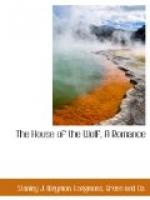“Go! go!” he continued to cry violently. “Have I brought you so far safely that you will cheat me of my vengeance at the last, and provoke me to kill you? Away! and take these blind puppies with you! Reckon me as much your enemy now as ever! And if I meet you, be sure you will meet a foe! Begone, M. de Pavannes, begone!”
“But, M. de Bezers,” Louis persisted, “hear me. It takes two to—”
“Begone! begone! before we do one another a mischief!” cried the Vidame furiously. “Every word you say in that strain is an injury to me. It robs me of my vengeance. Go! in God’s name!”
And we went; for there was no change, no promise of softening in his malignant aspect as he spoke; nor any as he stood and watched us draw off slowly from him. We went one by one, each lingering after the other, striving, out of a natural desire to thank him, to break through that stern reserve. But grim and unrelenting, a picture of scorn to the last, he saw us go.
My latest memory of that strange man—still fresh after a lapse of two and fifty years—is of a huge form towering in the gloom below the state canopy, the sunlight which poured in through the windows and flooded us, falling short of him; of a pair of fierce cross eyes, that seemed to glow as they covered us; of a lip that curled as in the enjoyment of some cruel jest. And so I—and I think each of us four saw the last of Raoul de Mar, Vidame de Bezers, in this life.
He was a man whom we cannot judge by to-day’s standard; for he was such an one in his vices and his virtues as the present day does not know; one who in his time did immense evil—and if his friends be believed, little good. But the evil is forgotten; the good lives. And if all that good save one act were buried with him, this one act alone, the act of a French gentleman, would be told of him—ay! and will be told—as long as the kingdom of France, and the gracious memory of the late king, shall endure.
* * * * * *
I see again by the simple process of shutting my eyes, the little party of five—for Jean, our servant, had rejoined us—who on that summer day rode over the hills to Caylus, threading the mazes of the holm-oaks, and galloping down the rides, and hallooing the hare from her form, but never pursuing her; arousing the nestling farmhouses from their sleepy stillness by joyous shout and laugh, and sniffing, as we climbed the hill-side again, the scent of the ferns that died crushed under our horses’ hoofs—died only that they might add one little pleasure more to the happiness God had given us. Rare and sweet indeed are those few days in life, when it seems that all creation lives only that we may have pleasure in it, and thank God for it. It is well that we should make the most of them, as we surely did of that day.
It was nightfall when we reached the edge of the uplands, and looked down on Caylus. The last rays of the sun lingered with us, but the valley below was dark; so dark that even the rock about which our homes clustered would have been invisible save for the half-dozen lights that were beginning to twinkle into being on its summit. A silence fell upon us as we slowly wended our way down the well-known path.




